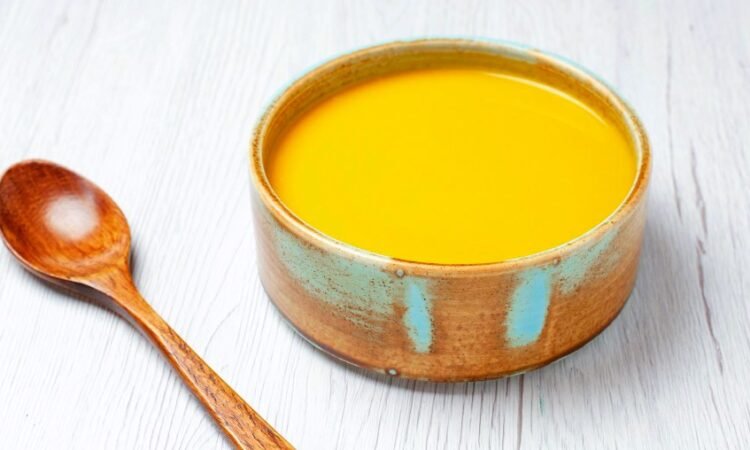
Here are some of the benefits of desi ghee for health:
– Rich Source of Healthy Fats: Desi ghee is a good source of healthy saturated fats, which can provide long-lasting energy.
– Rich in Vitamins A, D, E, and K: These fat-soluble vitamins play crucial roles in various bodily functions, including immune support, bone health, and blood clotting.
– Contains Conjugated Linoleic Acid (CLA): CLA is a fatty acid that may have anti-inflammatory and anti-cancer properties, although more research is needed.
– Supports Digestion: Ghee is rich in butyric acid, a short-chain fatty acid that supports a healthy digestive tract.
– May Help Maintain a Healthy Heart: Some studies suggest that moderate consumption of ghee may have a neutral or positive effect on heart health, especially when compared to certain vegetable oils.
– Contains Antioxidants: Ghee is a source of antioxidants that can help protect cells from damage caused by free radicals.
– Supports Brain Health: The omega-3 fatty acids in ghee may contribute to brain health and cognitive function.
– Lactose and Casein-Free: Ghee is clarified butter, meaning it’s free from milk solids like lactose and casein, making it suitable for those with lactose intolerance or dairy allergies.
– Anti-Inflammatory Properties: Ghee contains compounds that may have anti-inflammatory effects, which can be beneficial for those with inflammatory conditions.
– Enhances Flavor in Cooking: Ghee adds a rich, nutty flavor to dishes and is a versatile cooking fat.
Desi ghee is a versatile cooking fat that can be used in various ways. Here’s how you can use it:
1. Cooking and Frying: Desi ghee has a high smoke point, which means it can withstand high temperatures without breaking down or producing harmful compounds. This makes it suitable for frying, sautéing, and deep frying.
2. Baking: Ghee can be used in baking recipes that call for butter or other fats. It adds a rich, nutty flavor to baked goods.
3. Seasoning Dishes: Add a spoonful of ghee to finished dishes like dals, soups, or curries for extra flavor and richness.
4. Roasting Vegetables: Coat vegetables in ghee before roasting them in the oven. This enhances their flavor and helps achieve a nice caramelization.
5. Making Sauces and Gravies: Ghee can be used as a base for making sauces, gravies, and curry dishes. Its rich flavor adds depth to the flavor profile.
6. Spreading on Bread or Toast: Use ghee as a spread on bread or toast for a nutritious and flavorful alternative to butter.
As for the best time to use ghee, it largely depends on personal preference and dietary habits. Here are a few suggestions:
1. In the Morning: Some people like to start their day with a spoonful of ghee, believing it provides sustained energy and supports digestion.
2. During Cooking: Incorporate ghee into your meals as a cooking fat. This can be done at any time of day, depending on your meal schedule.
3. Before Exercise: Some individuals consume ghee before a workout for a source of energy. However, this should be done in moderation and according to individual dietary preferences.
4. In Evening Tea or Coffee: Adding a small amount of ghee to your tea or coffee is a practice in some cultures, believed to provide a boost of energy.
5. In Ayurvedic Practices: Ayurveda recommends consuming ghee at different times of the day based on one’s dosha (constitution). For specific recommendations, it’s best to consult an Ayurvedic practitioner.
Remember, the key is moderation. While desi ghee offers health benefits, it is calorie-dense, so be mindful of portion sizes. Always consult a healthcare professional or a registered dietitian if you have specific dietary concerns or health conditions.




